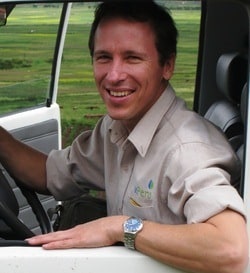 Frank Hajek and his team are working to change the ways we think about and conduct conservation in the Amazon basin. Hajek, founder and director of Nature Services Peru, an environmental consulting firm, and SEPeru, a non-profit conservation organization, visited WFU in October, to deepen the partnership with CEES in conserving Amazonian biodiversity and ecosystems. He spoke to students and faculty in the Biology and Masters in Sustainability programs, encouraging a dialogue about how and why we conduct conservation.
Frank Hajek and his team are working to change the ways we think about and conduct conservation in the Amazon basin. Hajek, founder and director of Nature Services Peru, an environmental consulting firm, and SEPeru, a non-profit conservation organization, visited WFU in October, to deepen the partnership with CEES in conserving Amazonian biodiversity and ecosystems. He spoke to students and faculty in the Biology and Masters in Sustainability programs, encouraging a dialogue about how and why we conduct conservation.
Ecosystem management and conservation efforts have traditionally utilized a framework that values specific items in order to obtain conservation objectives. For example, the United Nations’ Reduce Emissions from Deforestation and forest Degradation (REDD+) program values standing, intact forests as carbon capture and storage systems. While this program and other like it have been successful in providing funds to keep forests in the Amazon and around the world standing, they have their weaknesses. The REDD+ framework, for example, requires a large amount of environmental planning and assessment before REDD+ credits can be granted. This process is expensive and complex and, as a result, frequently lies beyond the reach of indigenous communities in Peru.
Nature Services Peru and SEPeru work to bridge the gap between REDD+ and other large-scale conservation initiatives and indigenous communities in Peru. Using this approach, Hajek and his team are able to assist these communities in protecting and preserving their land and provide them incentive to do so through carbon credit systems which would be inaccessible to them otherwise. This approach is already paying dividends by placing indigenous communities at the center of conservation efforts, supporting them in their efforts to protect their land and preserve their way of life.



